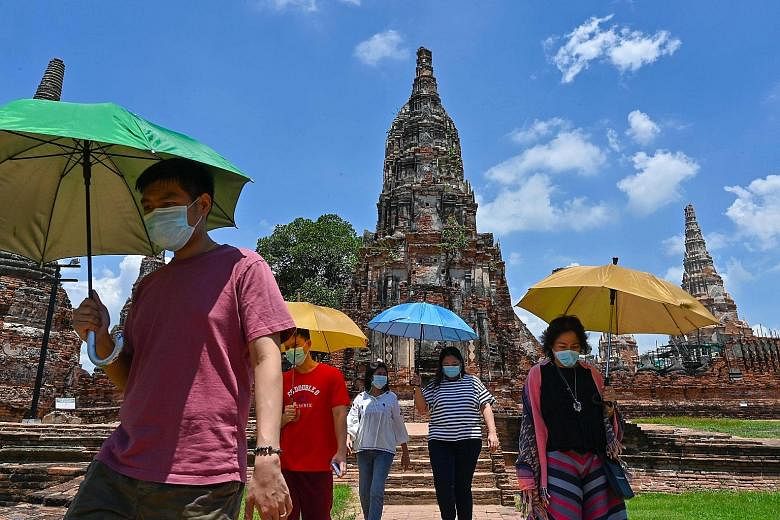BANGKOK • Many small and medium-sized enterprises (SMEs) - the backbone of Thailand's economy - are struggling with crushing debt loads that could force them out of business as the latest wave of Covid-19 infections dims the prospects for an economic recovery.
"This round is much worse than last year, and millions of operators are suffering," said Mr Sangchai Theerakulwanich, chairman of the Federation of Thai SME, who submitted a proposal last month for the government to boost support for smaller businesses.
"If the situation is prolonged to the end of the year, the nation will be in crisis, with 80 per cent of us going bankrupt."
Thailand's SMEs, many of them concentrated in the tourism industry, have been hit especially hard since the country closed its borders last year, sending the economy into its deepest contraction in more than two decades. The situation has worsened, with daily cases and deaths at record levels, leading the government to impose fresh restrictions late last month.
The Bank of Thailand has called repeatedly to boost liquidity to SMEs, which are seen as crucial to any economic recovery.
So far, though, efforts to channel billions of dollars of credit at low interest rates, institute loan-payment holidays and offer credit guarantees have failed to breathe life into the sector.
"Credit growth to large corporates has been growing at over 10 per cent a year. Even for the household sector, credit growth has also been growing at about 4 per cent a year," said central bank governor Sethaput Suthiwartnarueput in March. "The segment where credit growth has been shrinking is the SMEs."
As at last year, Thailand had 3.1 million SMEs employing 12.7 million people, according to government data. The Thai Chamber of Commerce believes the real number of SMEs could be as high as five million, as many smaller operators do not register with the authorities.
Last month, the central bank slashed its economic growth forecast for this year to 1.8 per cent, from 3 per cent previously, amid weak domestic consumption and repeated cuts to the tourism outlook.
Before the pandemic, tourism contributed about 20 per cent of the country's gross domestic product - about double the global average - but the bank now expects only 700,000 visitors to enter Thailand this year, down from almost 40 million in 2019.
Ms Patcharabhorn Salacheep, 34, who owns a body-painting business catering to foreigners, shut her Pattaya and Phuket outlets last year as the borders closed and tourism withered. After shedding 70 per cent of her staff, she still has three shops in Bangkok's Chatuchak weekend market but earns only about 10 per cent of what she used to.
She is looking to borrow money to sustain the business, but is not sure if she will be approved for a bank loan.
"If I don't get it, my business may not survive this year," Ms Patcharabhorn said. "The government never compensated us for what we're facing. What they offer are only debt restructuring and loans. They are pushing us to create debts while we barely earn income."
The latest debt-relief measures for SMEs include 250 billion baht (S$10.4 billion) in low-interest loans for business restructuring and 100 billion baht for an "asset warehouse", where struggling businesses can temporarily park their distressed assets and get credit in return.
Since the measures took effect in late April, about 24 per cent of the total set aside for low-interest loans has been used, and less than 1 per cent of the amount intended for the asset-warehouse plan.
Dr Sethaput said demand for the asset warehouse is expected to pick up later.
According to the Federation of Thai SME, bank loans to smaller businesses total 3.5 trillion baht, including 240 billion baht that are non-performing. Another 440 billion baht are rated scarcely higher and may turn bad by the year end if the economy does not improve, according to the federation.
"Liquidity is not a silver bullet to cure everything," said Mr Naris Sathapholdeja, an economist at Bangkok-based TMBThanachart Bank.
"Those who'll get soft loans are those with business prospects and positive income. If you're still in the debt restructuring process with banks or can't generate positive income, you're unlikely to get the loans. Banks need to be careful under the current situation. No one wants to shoulder piles of bad debts once the situation eases."
Dr Sethaput said not all SMEs will be approved for the relief measures. Those that should are the ones that can survive until the economy starts to recover.
"Not all businesses that get loans will survive," he said. "If we lend what we have to all groups, it may make those that should survive fail too. Everything has an opportunity cost."
BLOOMBERG

